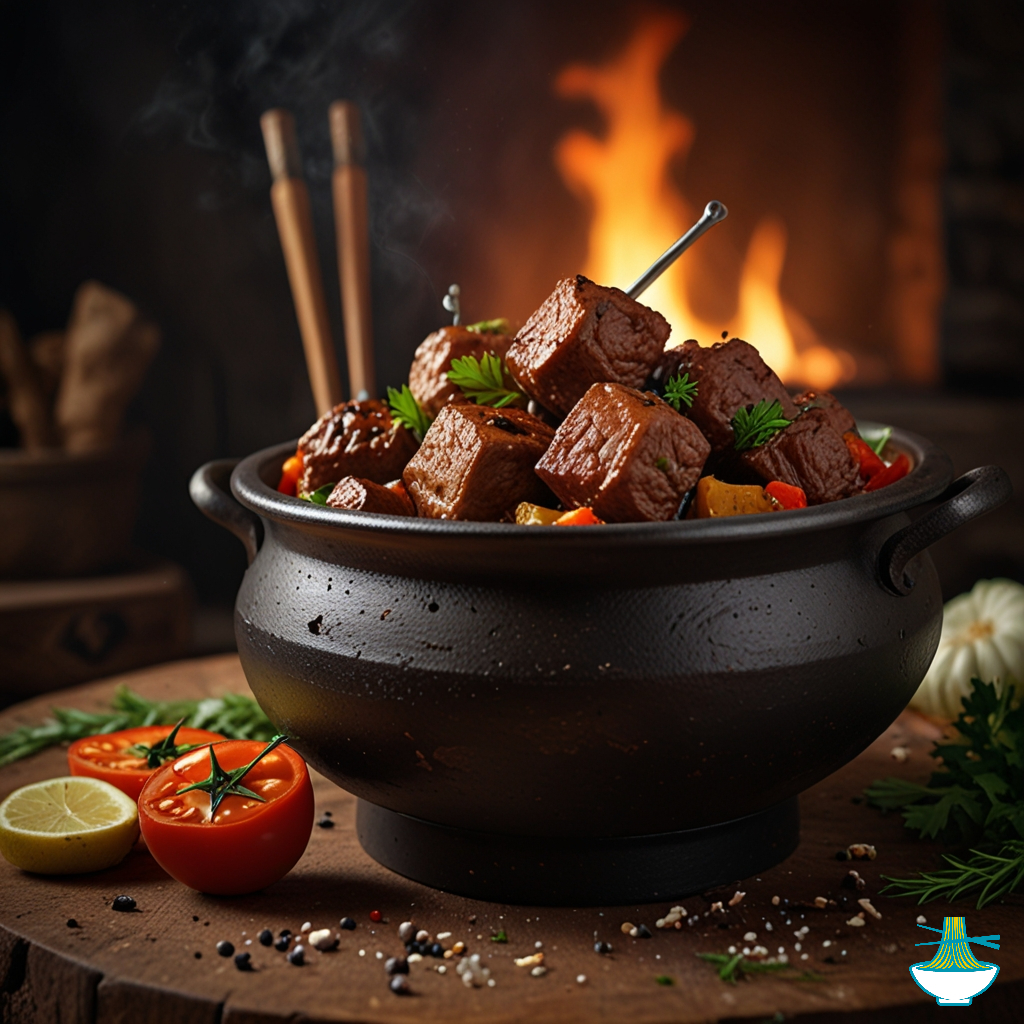Kazan Kabob, a beloved dish originating from Central Asia, is a hearty meat stew cooked in a large cauldron known as a kazan. This traditional recipe has deep cultural roots, reflecting the nomadic heritage of the region and the necessity for robust, nourishing meals. Typically made with tender chunks of meat, an array of vegetables, and a blend of aromatic spices, Kazan Kabob offers a flavorful and satisfying dining experience. Over generations, it has evolved as a staple dish, celebrated during festive gatherings and everyday meals alike, embodying the rich culinary traditions of Central Asian cuisine.
Ingredients:
- 1 kg (2.2 lbs) meat (beef, lamb, or chicken), cubed
- 2 onions, finely chopped
- 3 carrots, sliced
- 3 potatoes, cubed
- 2 tomatoes, diced
- 3 cloves of garlic, minced
- 2 tablespoons vegetable oil
- Salt and pepper to taste
- Spices (such as paprika, cumin, and coriander) to taste
- Fresh herbs (such as parsley or cilantro) for garnish
Method:
1. Heat vegetable oil in a large cauldron or a heavy-bottomed pot over medium heat.
2. Add chopped onions and minced garlic, sauté until softened and fragrant.
3. Add cubed meat to the pot, season with salt, pepper, and your choice of spices. Cook until meat is browned on all sides.
4. Add sliced carrots, cubed potatoes, and diced tomatoes to the pot. Stir well to combine.
5. Pour enough water to cover the ingredients in the pot. Bring to a boil, then reduce heat to low and let simmer for about 1-2 hours, or until the meat is tender and the vegetables are cooked through.
6. Adjust seasoning if needed. Serve hot, garnished with fresh herbs. Enjoy your flavorful Kazan Kabob!
Nutrition Value:
1. Meat (Beef, Lamb, or Chicken):
- Calories: Varies (e.g., approximately 250-300 kcal per 100g depending on the type and cut).
- Carbohydrates: Negligible.
- Protein: Approximately 20-25g per 100g.
- Fat: Varies (e.g., approximately 15-20g per 100g depending on the type and cut).
- Sodium: Varies.
- Cholesterol: Varies.
- Vitamins & Minerals: Rich in B vitamins, iron, zinc, and selenium.
- Nutritional Benefit: Provides high-quality protein and essential nutrients.
2. Onions:
- Calories: Approximately 40 kcal per 100g.
- Carbohydrates: Approximately 9g per 100g.
- Protein: Approximately 1g per 100g.
- Fat: Negligible.
- Sodium: Low.
- Cholesterol: None.
- Vitamins & Minerals: Rich in vitamin C, vitamin B6, folate, and potassium.
- Nutritional Benefit: Source of antioxidants and anti-inflammatory properties.
3. Carrots:
- Calories: Approximately 41 kcal per 100g.
- Carbohydrates: Approximately 10g per 100g.
- Protein: Approximately 1g per 100g.
- Fat: Negligible.
- Sodium: Low.
- Cholesterol: None.
- Vitamins & Minerals: Rich in vitamin A, vitamin K1, potassium, and beta carotene.
- Nutritional Benefit: Excellent for eye health and immune function.
4. Potatoes:
- Calories: Approximately 77 kcal per 100g.
- Carbohydrates: Approximately 17g per 100g.
- Protein: Approximately 2g per 100g.
- Fat: Negligible.
- Sodium: Low.
- Cholesterol: None.
- Vitamins & Minerals: Rich in vitamin C, potassium, vitamin B6, and manganese.
- Nutritional Benefit: Source of energy and potassium.
5. Tomatoes:
- Calories: Approximately 18 kcal per 100g.
- Carbohydrates: Approximately 4g per 100g.
- Protein: Approximately 1g per 100g.
- Fat: Negligible.
- Sodium: Low.
- Cholesterol: None.
- Vitamins & Minerals: Rich in vitamin C, vitamin K1, potassium, and lycopene.
- Nutritional Benefit: High in antioxidants and may reduce the risk of certain diseases.
6. Garlic:
- Calories: Approximately 149 kcal per 100g.
- Carbohydrates: Approximately 33g per 100g.
- Protein: Approximately 6g per 100g.
- Fat: Negligible.
- Sodium: Low.
- Cholesterol: None.
- Vitamins & Minerals: Rich in vitamin C, vitamin B6, manganese, and allicin.
- Nutritional Benefit: Supports heart health and immune function.
7. Vegetable Oil:
- Calories: Approximately 900 kcal per 100g.
- Carbohydrates: None.
- Protein: None.
- Fat: Approximately 100g per 100g.
- Sodium: None.
- Cholesterol: None.
- Vitamins & Minerals: Contains vitamin E.
- Nutritional Benefit: Provides essential fatty acids.
8. Salt and Pepper:
- Calories: None.
- Carbohydrates: None.
- Protein: None.
- Fat: None.
- Sodium: High (depends on usage).
- Cholesterol: None.
- Vitamins & Minerals: None.
- Nutritional Benefit: Adds flavor to the dish.
9. Spices (Paprika, Cumin, Coriander, etc.):
- Calories: Negligible.
- Carbohydrates: Negligible.
- Protein: Negligible.
- Fat: Negligible.
- Sodium: Negligible.
- Cholesterol: None.
- Vitamins & Minerals: Varies depending on the spice.
- Nutritional Benefit: Adds flavor and aroma.
10. Fresh Herbs (Parsley or Cilantro):
- Calories: Approximately 36 kcal per 100g.
- Carbohydrates: Approximately 6g per 100g.
- Protein: Approximately 3g per 100g.
- Fat: Approximately 1g per 100g.
- Sodium: Low.
- Cholesterol: None.
- Vitamins & Minerals: Rich in vitamin K, vitamin C, and antioxidants.
- Nutritional Benefit: Adds freshness and small amounts of vitamins.


Comments